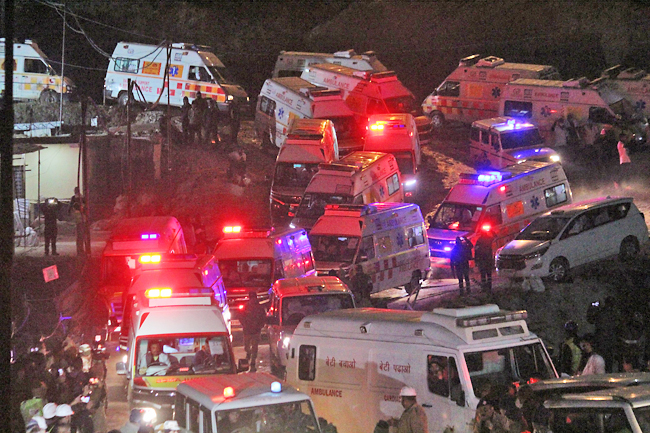NEW DELHI (AP) – The rescue mission was expected to last only a few days. Instead, it took 17 days to reach 41 construction workers who were trapped when a landslide collapsed a mountain tunnel in northern India earlier this month.
The excruciating wait finally ended at nightfall on Tuesday, as temperatures dropped near the accident site in the mountainous state of Uttarakhand. Everyone was pulled out alive.
But beyond the jubilation and relief, questions remain as to why what became one of the most significant and complicated rescue operations in India’s recent history – aided by international tunneling experts and spearheaded by multiple rescue agencies – took so long.
HOW THE RESCUE UNFOLDED
News of the trapped workers spread fast after a November 12 early morning landslide caused a portion of the 4.5-kilometre Silkyara Tunnel they were building near the town of Uttarkashi in Uttarakhand state to collapse about 200 metres (m) from the entrance.
No one was seriously injured or killed in the collapse but the engineers on the team knew they had their task cut out for them. They had to penetrate through rocks and metal to reach the workers trapped behind a wall of nearly 60m of debris.
At first, the rescuers tried to reach the trapped workers – all poor migrant labourers from across the country – by drilling horizontally through the debris, in a straight line, using excavators and drilling machines.


But the drilling machine broke down multiple times, frustrating the efforts of the rescuers who were working 24-hour shifts.
They went on digging horizontally by replacing the machine, and 10 days into the mission, a small camera was sent through a narrow pipe that captured initial images of the workers stuck in the tunnel. All were doing okay and hopes for their rescue grew.
MORE SETBACKS ALONG THE WAY
The rescuers saw their hopes dashed on the 13th day of the operation, when their drilling machine broke down beyond repair. They had less than 20m to go in the digging.
The families of the trapped workers grew anxious. Some were starting to panic.
The rescuers put an alternate plan in motion and began drilling from the top of the mountain – a path that required digging nearly twice the distance of the horizontal shaft.
The trapped workers, who were in the meantime being supplied with food and oxygen through a narrower pipe, were at the risk of falling sick. Officials who kept watch near the tunnel, and even local residents, began offering prayers at a small makeshift Hindu temple in the area, seeking divine help.
The clock was ticking and the engineers realised they could not give up on the horizontal drilling path, even as the vertical drilling began.
On Monday, they called in a team of miners to dig by hand the final stretch of the path and clear the way for a passageway to be made of welded metal pipes. Once the pipes were in place, rescuers pushed through the dirt and rocks.
By Tuesday, they had drilled through more than 58m. The plan was to pull out the trapped workers one by one, on wheeled stretchers through the pipes. Almost 24 hours later, all the 41 men were out.
WHAT HAPPENS NEXT?
The rescue operation was followed closely in this country of more than 1.4 billion people but as the nation watched the ordeal on live television, questions emerged as to whether the mountainous area in Uttarakhand can withstand the level of heavy construction that has recently been taking place.
The tunnel the workers were building was designed as part of the Chardham all-weather road, meant to connect various Hindu pilgrimage sites and temples. Large numbers of pilgrims and tourists visit Uttarakhand, with the numbers increasing steadily over the years.
Some experts say the project, a flagship initiative of the federal government, will exacerbate fragile conditions in the upper Himalayas, where several towns are built atop landslide debris.
Uttarakhand state, which is prone to landslides and flash floods exacerbated by climate change and is surrounded by melting glaciers, has already been in the news this year.
In February, many residents of the holy town of Joshimath, revered by both Hindu and Sikh pilgrims, had to temporarily relocate elsewhere after the ground beneath them began sinking, creating deep fissures in ceilings, floors and walls of hundreds of houses. Multi-storeyed hotels slumped to one side. Already cracked roads gaped open.
Experts and activists say such events could reoccur in other towns of Uttarakhand, a state that is being promoted for religious tourism by Prime Minister Narendra Modi’s governing party.



















































